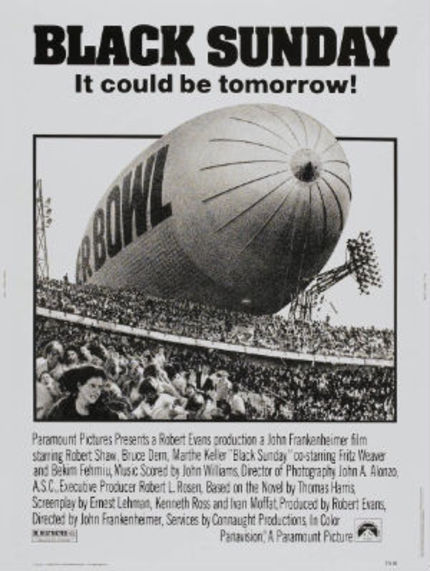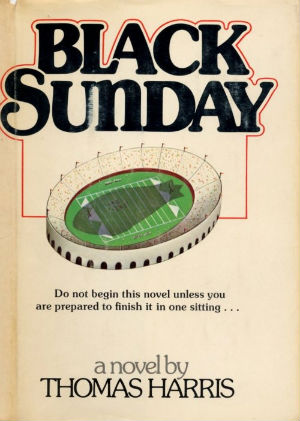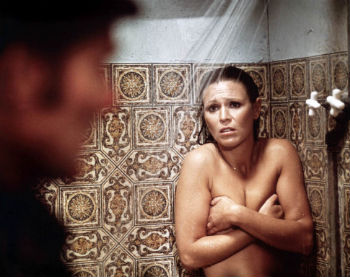70s Rewind: BLACK SUNDAY Scores with Football and Terrorism

Are you ready for some (American) football? And terrorism? And a blimp transformed into a weapon of mass destruction? And Bruce Dern as a crazy Vietnam vet?
John Frankenheimer's Black Sunday, based on a best-selling novel by Thomas (Call Me Hannibal) Harris, rolls those elements together into a thriller that builds tension relentlessly, despite a climax that is a foregone conclusion: We know the blimp will attack the Super Bowl.
The tension, naturally enough, comes from wondering how the attack is set up, who is involved in planning and executing it, and who will attempt to foil it.
Robert Shaw stars as Major David Kabakov, a merciless Mossad agent who, nonetheless, spares a woman in an opening sequence that is intended to wipe out a terrorist unit in Beirut. That mistake quickly comes back to haunt him when it's learned that the woman is Dahlia Iyad (Marthe Keller), she hates Jews, she is involved in a plot to bomb America, and she has disappeared.
Dahlia has teamed up with Michael Lander (Bruce Dern), the aforementioned Vietnam vet who has become mentally unstable after being held as prisoner of war for years and then coming home to find that his wife has abandoned him. Michael flies a Goodyear blimp that hovers over football games, and he has hatched a plan to kill 80,000 people. And the U.S. President. On national television.
It's a pretty good plan.
 Black Sunday began life as a collaborative effort between Thomas Harris and two colleagues. All three were working as reporters for the Associated Press in New York; Harris was on the crime beat. After researching and outlining the book together, Harris took over the project solo, quitting his job and returning to his boyhood hometown of Rich, Mississippi to write the novel.
Black Sunday began life as a collaborative effort between Thomas Harris and two colleagues. All three were working as reporters for the Associated Press in New York; Harris was on the crime beat. After researching and outlining the book together, Harris took over the project solo, quitting his job and returning to his boyhood hometown of Rich, Mississippi to write the novel.
The book goes to great lengths to explore the deep-seated motivations of Michael Lander, especially in regard to his youth spent as an outsider in a small Southern town. Longtime residents claim that Harris described his own childhood in the book, including specific scenes that provoke sympathy for a young character who would grow up to be a murderous monster.
Published in 1975, the novel spent 14 weeks on the New York Times best-seller list in the spring of that year. Harris went on to write Red Dragon, Silence of the Lambs, Hannibal, and Hannibal Rising.
In the screenplay credited to Ernest Lehman (North by Northwest), Kenneth Ross (The Odessa File), and Ivan Moffat (Giant), the first three chapters of the novel are translated faithfully, before sub-plots are dropped away in favor of the requirements of visual storytelling. Alas, that includes all the details of Michael Lander's childhood, save for a speech that refers to 'the Code of the South,' and so we're left with a villain whose chief motivation arises from his bitter experiences in Vietnam.
That placed the movie, released on March 11, 1977, on troubled ground, as the U.S. -- and Hollywood -- struggled to deal with the aftermath of the Vietnam War. Dern's Michael Lander fit neatly into the newly-minted, insulting, and demeaning stereotype of the returning veteran as a "crazy person." Less than a year later, Dern played another Vietnam vet in Coming Home. In that movie, his character returns with emotional issues only to find -- surprise! -- that his wife has been unfaithful to him.
In and admidst some dross, Dern put together a string of excellent performances in the 70s and early 80s, including Silent Running, The Laughing Policeman, Smile, The Driver, and, perhaps inevitably, Middle Aged Crazy. No one could play 'unhinged' like Bruce Dern, and so Black Sunday benefits from his furious anger.
 Shaw, coming off a rare leading man turn in Swashbuckler, proves to be an incredibly tough and terse protagonist as Kabakov. The source material featured an extended romance with a medical professional, which was a bit unlikely under the circumstances. Though that relationship allowed Kabakov to express his deep personal feelings, it actually works better in the film for the hero to be reduced to a cold professional. His actions are fully justified by the actions of the terrorists, so further motivations are not needed. (Shaw died from a heart attack in the summer of 1978, at the age of 51.)
Shaw, coming off a rare leading man turn in Swashbuckler, proves to be an incredibly tough and terse protagonist as Kabakov. The source material featured an extended romance with a medical professional, which was a bit unlikely under the circumstances. Though that relationship allowed Kabakov to express his deep personal feelings, it actually works better in the film for the hero to be reduced to a cold professional. His actions are fully justified by the actions of the terrorists, so further motivations are not needed. (Shaw died from a heart attack in the summer of 1978, at the age of 51.)
The rest of the cast, including Keller (enjoying her brief burst of Hollywood stardom), Fritz Weaver, Steven Keats, and, in small roles, Michael V. Gazzo and William Daniels, performs ably. John Williams composed the musical score; John A. Alonzo (Chinatown) served as director of photography; Tom Rolf (French Connection II, Taxi Driver) edited. Robert Evans produced.
The star of the show, obviously, is the Goodyear blimp, which was fictionalized as the Aldrich airship in Harris' novel. Reportedly, director John Frankenheimer had an established relationship with Goodyear dating back to when he made Grand Prix, and secured those rights, while the owner of the Miami Dolphins football team cleared things with the NFL. (Yes, all rather incredible to consider, with the hindsight of 35 years.)
Frankeheimer keeps the plot percolating, aided by the nervy performances and extended action sequences created expressly for the movie. The ending may not be very satisfying to modern audiences -- though I wonder if audiences in 1977 were as convinced as those in the TV spot, embedded below -- but it's a measure of the film's success that it's almost beside the point. The journey to terror may be what counts most in Black Sunday.
Black Sunday was released on Region 1 DVD (with no supplemental features) by Paramount on October 14, 2003, and is now officially out of print. It's available from some second-hand dealers.
Now a monthly column, 70s Rewind looks back at movies from the writer's favorite moviemaking decade.







